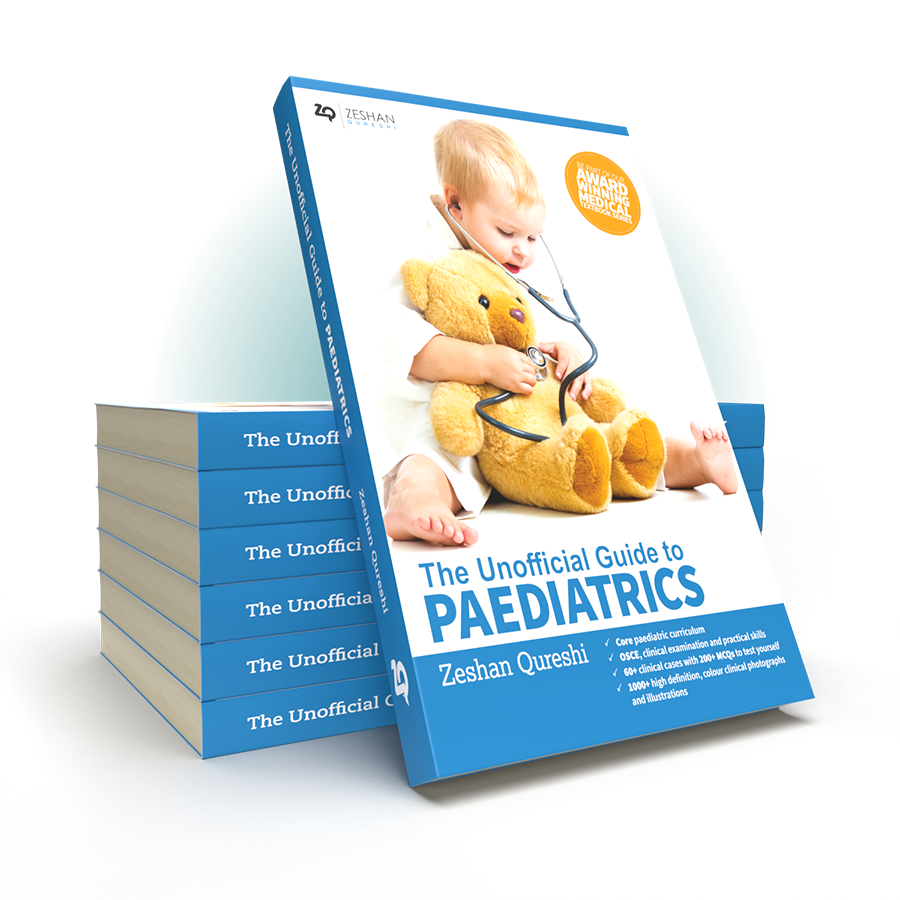

Chief Editor: Zeshan Qureshi
“The layout and attention to detail in this unofficial guide is a tremendous asset for aspiring paediatricians as well as for those professionals interested in community child health.”
Professor Anthony Costello FMedSci
Director, Department of Maternal, Newborn, Child and Adolescent Health, World Health Organisation
“The Unofficial Guide to Paediatrics is a wonderful compilation of a systems-based approach to a challenging subject matter, with something of interest for everyone. From the ‘sharp end’ of the complexities of adolescent medicine to the pragmatism of pursuing a career in paediatrics this volume is beautifully illustrated and well-referenced and contains a wealth of knowledge and experience from a range of contributors who clearly appreciate what life is like on the front line of paediatric practice.”

Dr Andrew Long
Vice President (Education), RCPCH
Consultant Paediatrician and Associate Medical Director, Great Ormond Street Hospital
“It’s always difficult to grasp what’s important when you’re approaching a subject like paediatrics. The Unofficial Guide to Paediatrics is smart because it tries to combine speciality-specific knowledge with the experience of practitioners at all levels and – most importantly – the duty of care and advocacy for children.”

Professor David Osrin
Professor of Global Health, UCL Institute for Global Health, UK
Honorary Consultant Paediatrician, Great Ormond Street Hospital, UK
“The first edition of ‘The Unofficial Guide to Paediatrics’ is a delight. It is a new kind of paediatrics textbook for a new generation of students and professionals learning about child health and clinical paediatrics. Its quality will ensure its position alongside the very best resources available for supporting those trying to improve health care for children worldwide.”

Dr Dan Magnus
Consultant Paediatric Emergency Medicine, Bristol Royal Hospital for Children, UK
“In the wonderful world of paediatrics, this is a wonderful resource for students, junior doctors, and paediatric trainees alike – or anyone looking for a simple and reliable complement to learning from the literature and clinical encounter. The development and success of this has been no child’s play – one might even say, it’s a milestone of an achievement!”

Beryl Lin
President, University of New South Wales Medical Society, Australia
“Congratulations to Zeshan and his colleagues on producing ‘The Unofficial Guide to Paediatrics’. It is a huge piece of work by trainees and experts for anybody who has an interest in paediatrics, from medical students to established consultants and anybody interested in caring for children.”
Dr Simon Broughton
Consultant Paediatrician, King’s College NHS Foundation Trust, UK
Almost every doctor will encounter children in their career; of course, this goes without saying for paediatricians, and in primary care approximately 25% of consultations involve children. Many other specialities encompass paediatric patients including general surgery, ENT and emergency medicine. Therefore, it is vital that all medical students and junior doctors have a core grounding in the fundamentals of paediatrics.
This book is primarily aimed at medical students, covering a wide range of common and important paediatric pathologies (in line with the national Royal College of Paediatrics and Child Health undergraduate curriculum). The unique collection of core clinical content, practical skills, clinical cases and examination skills in the book is equally valuable for junior doctors and paediatric trainees. Nurses, advanced nurse practitioners, physician associates and allied healthcare professionals will also find the content and approach useful.
The relevance of this book extends from undergraduate teaching to postgraduate education and as a day-to-day reference for healthcare professionals.
Written in line with the other books in the series, stations contain:
Core chapter summaries written using the latest guidelines, using a clinically relevant format for maximum knowledge and minimum waffle
Single best answer, true or false and extended matching questions to enable you to really test your knowledge.
Over 300 questions and fully explained answers with key points and compact learning summaries.
High quality colour images and illustrations throughout the book to present key concepts and anatomy.
24 fully illustrated chapters cover the core fundamental knowledge base of paediatrics, in line with the national RCPCH curriculum. Each disease uses a common framework; definition, aetiology and clinical features, and progresses through investigations, differential diagnoses, management, complications, and finally prognosis.